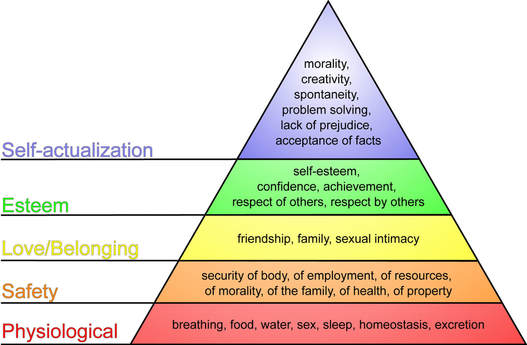|
Yesterday I heard a story (or maybe it was a follow up to a story the a story I read that the World Bank put out in 2016) either way, it was a story about a dump turned into recycling facility in Rabat, Morocco. I thought it was an excellent example of how that world is changing. I went to business school for my undergrad and I’m sure if you’ve gone to business school you know that Maslow’s Hierarchy of needs comes up often. But does business even care about this model in a post-post Marshall Plan United States, where we are meant to work and consume without consideration for waste? With more sustainable plans and a more sustainable view of capitalism each person is a producer and a consumer no matter your class, which holds dignity, purpose, and much less waste. According the the article by the BBC “The Scavenger Who Runs the Dump” Yassine Mazzout, began his tenure at the dumb in Rabat Morocco 14 years ago after he lost his father. When he was a teenager, he scavenged at the dump to provide support for his family. As a kid he felt there was no way out of this way of living. A way of living that felt inhumane. He spent hours each day outside in the blistering sun with no protection. He also had no rights - there was no guarantee he would make it out of the dump with his bounty. Gangs waited outside the dump at night to rob folks of what they had found. In 2013, the Moroccan government set out with an initiative called Programme National des Déchets Ménagers (National Household Waste Program), where they have a goal of increasing the rate of recycling to 20% by the year 2020. The program has sought four World Bank Municipal Solid Waste Development Policy Loans (DPL). Thanks to the National Household Waste Program, the dump that Yassine spent his childhood years collecting from is privately run. They have also co-sponsored a cooperative where the folks who used to be scavenging from the dump are now employed by the cooperative. Yassine is the president of this cooperative and explained that these people now have protective clothes to work in, they make a salary, and have health care provided by the co-op. About 150 members of the cooperative decide as a group who to sell the sorted waste to. Although some people make less than they were scavenging on their own they receive more support and more benefits today such as health insurance, access to a bank account and low mortgages. The recycling cooperative doesn’t only help the folks working there but it helps the overall ecosystem of the surrounding community and in turn the world. In 2016, the World Bank noted that the workers extract about 2,200 tons of solid trash per year for resale and turned about 100,000 tons of green garden waste to compost. This significantly reduced the amount of waste that needs to be buried prolonging the lifespan of the site itself. What’s significant to me about this program is that it represents government policy that has shaped the private sector for the better. Although there are socialist aspects to the overall recycling system in play here, it is a private company that owns the dump and the land. American’s need not be afraid of sustainability, especially if we aim for a type of sustainable capitalism. Below I’ve added an image of Maslow’s Hierarchy of Needs. It’s easy to see that the dump, prior to the recycling initiative, only provided the people living off of the waste with their basic physiological needs. However, after the recycling initiatives were implemented the dump provides nearly all of a human being’s needs. This is good for business, the community, and the environment. At this point in our human evolution there is no good reason not to implement programs similar to the program in Rabat Morocco. It is just poor government policy that the U.S. doesn’t have similar goals for a less wasteful society - waste in the form of food, goods and most importantly human beings. Perhaps if we wasted human beings less there would be less need to hate, kill, and harm others. Maslow’s Hierarchy of needs:
0 Comments
Leave a Reply. |
Megan PicurroThe ultimate question I must ask myself is, "why am I not more like myself? Why am I not more like the person I was born to be?" My soul and yours are equally a spark of G-d, the universe or whatever you believe but each spark bring a unique light into the world. It shines in a way no other soul can, and we have the opportunity to bring goodness, holiness, righteousness, and healing in specific ways and to specific people and situations which no one else can. Archives
August 2024
Categories |

 RSS Feed
RSS Feed